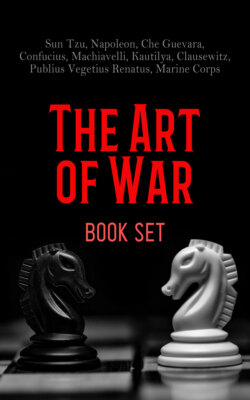Читать книгу The Art of War - Book Set - Carl von Clausewitz - Страница 151
На сайте Литреса книга снята с продажи.
CHAPTER VII. EXAMINATION OF SUDDEN DEATH.
ОглавлениеTable of Contents
IN cases of sudden death, the corpse shall be smeared over with oil and examined.
Any person whose corpse is tainted with mucus and urine, with organs inflated with wind, with hands and legs swollen, with eyes open, and with neck marked with ligatures may be regarded as having been killed by suffocation and suppression of breathing.
Any person with contracted arms and thighs may be regarded as having been killed by hanging.
Any dead person with swollen hands, legs and belly, with sunken eyes and inflated navel may be regarded as having been killed by hanging.
Any dead person with stiffened rectum and eyes, with tongue bitten between the teeth, and with belly swollen, may be considered as having been killed by drowning.
Any dead person, wetted with blood and with limb, wounded and broken, may be regarded as having been killed with sticks or ropes.
Any dead person with fractures and broken limbs, may be regarded as having been thrown down.
Any dead person with dark coloured hands, legs, teeth, and nails, with loose skin, hairs fallen, flesh reduced, and with face bedaubed with foam and saliva, may be regarded as having been poisoned.
Any dead person of similar description with marks of a bleeding bite, may be considered as baving been bitten by serpents and other poisonous creatures.
Any dead person, with body spread and dress thrown out after excessive vomitting and purging may be considered as having been killed by the administration of the juice of the madana plant.
Death due to any one of the above causes is, sometimes under the fear of punishment, made to appear as having been brought about by voluntary hanging, by causing marks of ligature round the neck.
In death due to poison, the undigested portion of meat may be examined in milk. Or the same extracted from the belly and thrown on fire may, if it makes ‘chitchita’ sound and assumes the rainbow colour, be declared as poisoned.
Or when the belly (hridayam) remains unburnt, although the rest of the body is reduced to ashes, the dead man's servants may be examined as to any violent and cruel treatments they may have received at the hands of the dead. Similarly such of the dead man's relatives as a person of miserable life, a woman with affections placed elsewhere or a relative defending some woman that has been deprived of her inheritance by the dead man may also be examined.
The same kind of examination shall be conducted concerning the hanging of the body of an already dead man.
Causes such as past evils or harm done to others by a dead man, shall be inquired into regarding any death due to voluntary hanging.
All kinds of sudden death, centre round one or the other of the following causes:--
Offence to women or kinsmen, claiming inheritance, professional competition, hatred against rivals, commerce, guilds and any one of the legal disputes, is the cause of anger: anger is the cause of death.
When, owing to false resemblance, one's own hirelings, or thieves for money, or the enemies of a third person murder one, the relatives of the deceased shall be inquired as follows:--
Who called the deceased; who was with him; who accompanied him on his journey; and who took him to the scene of death?
Those who happened to be at the locality of murder shall be severally asked as follows:--
By whom the deceased was brought there; whether they (the witnesses) saw any armed person lurking in the place and showing signs of troubled appearance?
Any clue afforded by them shall be followed in further enquiry.
After examining the personal property such as travelling requisites, dress, jewels, or other things which the deceased had on his body while murdered, such persons as supplied or had something to do with those things shall be examined as to the associates, residence, causes of journey, profession, and other calls of the deceased.
If a man or woman under the infatuation of love, anger, or other sinful passions commits or causes to commit suicide by means of ropes, arms, or poison, he or she shall be dragged by means of a rope along the public road by the hands of a Chandála.
For such murderers as the above, neither cremation rites nor any obsequies usually performed by relatives shall be observed.
Any relative who performs funeral rites to such wretches, shall either himself be deprived of his own funerals or be abandoned by his kith and kin.
Whoever associates himself with such persons as perform forbidden rites, shall with his other associates, if any, forfeit within a year the privileges of conducting or superintending a sacrifice, of teaching, and of giving or receiving gifts.
[Thus ends Chapter VII, “Examination of sudden death,” in Book IV, “The Removal of Thorns” of the Arthasásatra of Kautilya. End of the eighty-fourth chapter from the beginning.]
